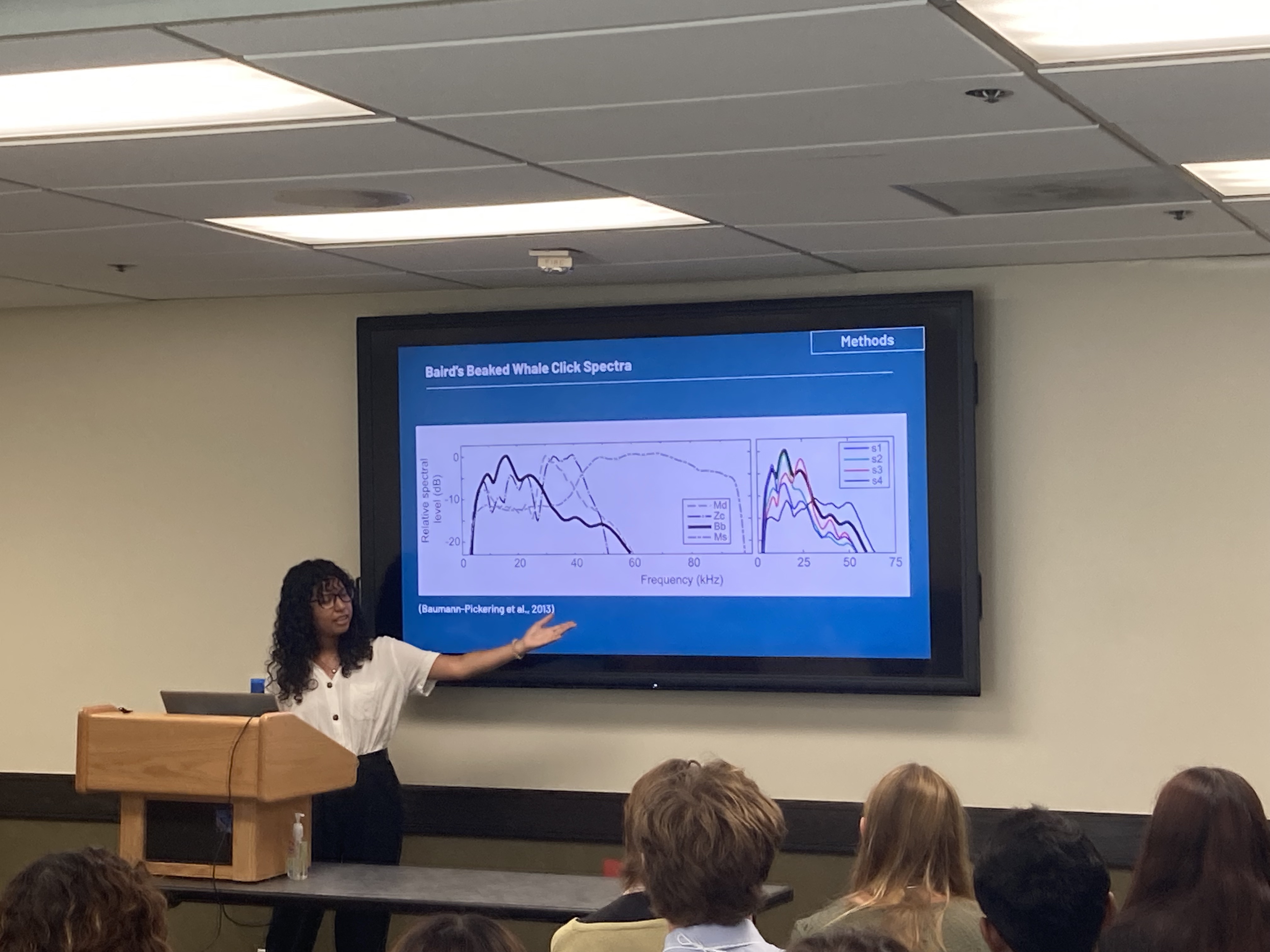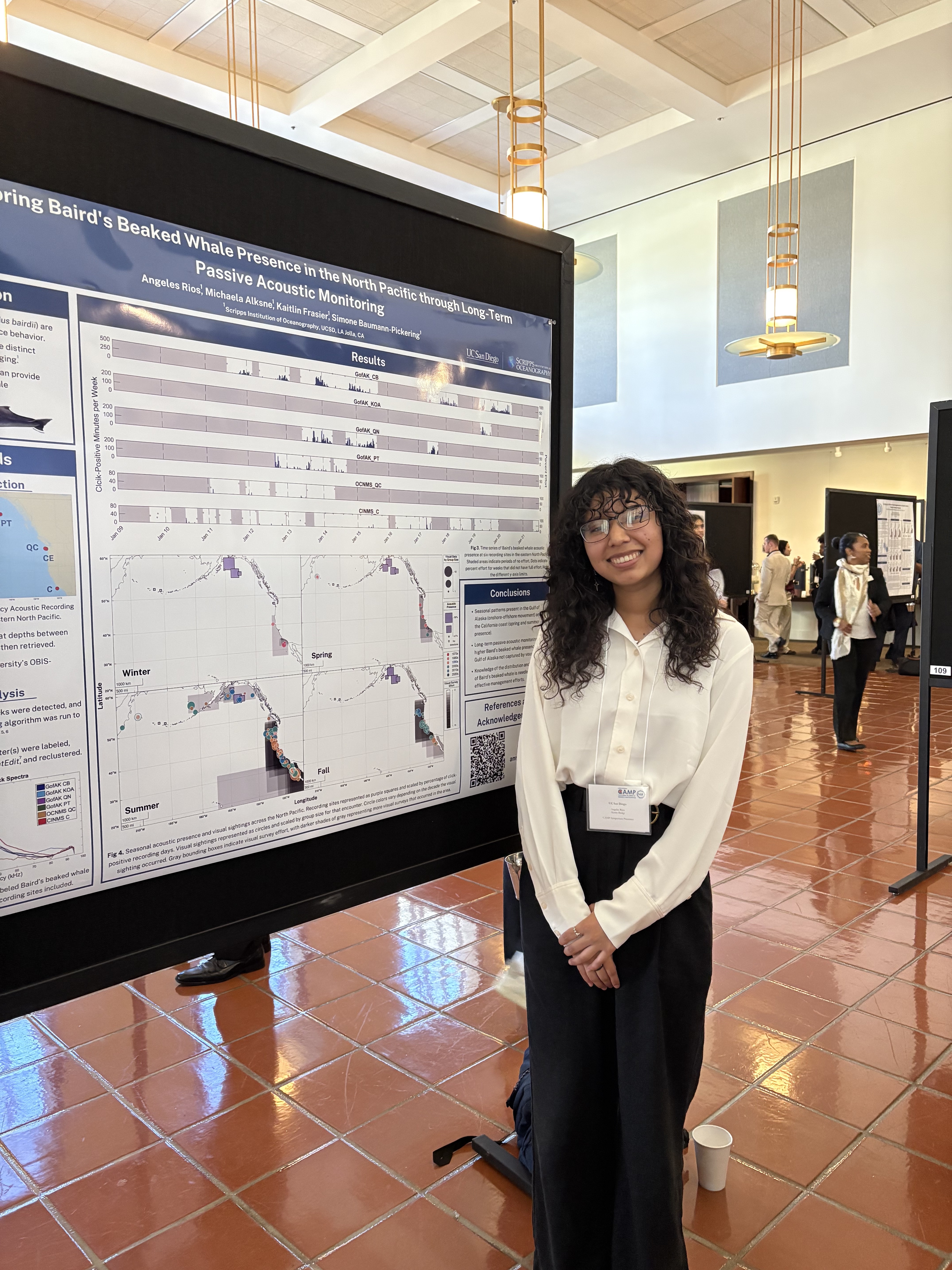I Am a Researcher
Angeles Rios
Major(s): Marine Biology
College: Muir College
UC San Diego graduation year: 2026
URH Research Programs:
- California Louis Stoke Alliance for Minority Participation (CAMP) (Summer 2024 - Present)
What are you researching (or did you do in the past)?
As part of the Scripps Acoustic Ecology Lab, I have been investigating the spatiotemporal presence of Baird's beaked whales in the North Pacific using passive acoustic data. Baird’s beaked whales are deep-diving toothed whales that spend limited time at the surface, making it challenging to rely on visual surveys to learn about their distribution. However, they produce unique echolocation clicks when foraging for prey and are used to identify their presence near underwater recording sites.
Why and how did you decide to get involved in undergraduate research?
I first got involved in undergraduate research the summer after my freshman year through the CCE-LTER REU program. Before this opportunity, research seemed intimidating to me because I didn't have a clear idea about how it was conducted. I decided to apply to gain a better understanding of the research experience and decide for myself if I was capable of being a researcher. I was offered the opportunity to work in the Scripps Acoustic Ecology Lab under Dr. Simone Baumann-Pickering and PhD candidate Michaela Alksne, and I quickly became fascinated with acoustic ecology. I was able to continue working in my lab during the school year, and for the following summer I had the opportunity to get funding and additional professional development through the CAMP program.
What has been the most exciting/interesting thing you've discovered through this research?
The most exciting thing I've discovered through my research has been the seasonal patterns Baird’s beaked whale exhibits in the Gulf of Alaska and off Point Conception in California. In the Gulf of Alaska, this species has increased presence near the continental slope during the winter and relatively lower presence at this site during the summer. Off of the California coast, Baird's beaked whales have higher acoustic presence during the spring and summer months. These trends are valuable information for management and conservation efforts, especially when it's difficult to observe these trends from visual observations alone.
 What did you gain from this program/experience?
What did you gain from this program/experience?
I've learned how to present research with the audience in mind to ensure they understand how I carried out my project. Through the Summer Research Conference and the CAMP Symposium, I have become more confident with presenting in front of people and answering questions about my work. I've also gained so much experience with coding and creating figures, something I had never done before being a part of this lab. I've learned to love the creativity that goes into coding and I realized this is a skill I want to continue developing.
What advice would you give to students starting research?
Don't be afraid to ask your mentors and lab members questions! Especially at the beginning, there is going to be a learning curve and you might have a lot of uncertainties about your research project. Mentors are there to help you out, so always reach out if you need any clarification or just want to have a chat about research in your field. Networking with lab members is also important because they can often provide you with future research or job opportunities.
What are your future goals?
I'm still exploring my career options, but I would love to combine both scientific research and community outreach! I want to ensure underrepresented communities get the opportunity to explore science and learn about what it's like to conduct research.
Anything else you want to share?
If you're interested in research or any job opportunity but don't feel like you meet the qualifications, you should still apply! Being genuinely interested in the opportunity and showing that you are committed to learning new skills can often help you get the opportunity you want.
Pictures
- Angeles Rios Profile
- Angeles Rios presenting her research
